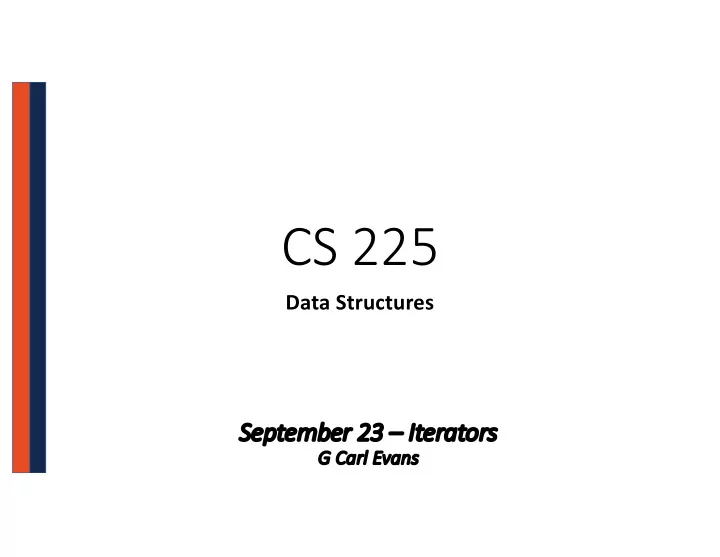

CS 225 Data Structures Se Septembe ber 23 23 – It Iterators G G Carl Evans
CS 225 CS 225 So So Far… r… List ADT • Linked Memory Implementation (“Linked List”) • O(1) insert/remove at front/back • O(1) insert/remove after a given element • O(n) lookup by index • Array Implementation (“Array List”) • O(1) insert/remove at front/back • O(n) insert/remove at any other location • O(1) lookup by index
CS CS 225 225 So So Far… r… Queue ADT • [Order]: • [Implementation]: • [Runtime]:
CS CS 225 225 So So Far… r… Stack ADT • [Order]: • [Implementation]: • [Runtime]:
Queue.h What type of implementation is this Queue? 1 #pragma once 2 3 template <typename T> 4 class Queue { 5 public: 6 void enqueue(T e); 7 T dequeue(); How is the data stored on this Queue? 8 bool isEmpty(); 9 10 private: 11 T *items_; 12 unsigned capacity_; 13 unsigned count_; 14 }; 15 16 17 18 19 20 21 22
Queue.h What type of implementation is this Queue? 1 #pragma once 2 3 template <typename T> 4 class Queue { How is the data stored on this Queue? 5 public: 6 void enqueue(T e); 7 T dequeue(); Queue<int> q; 8 bool isEmpty(); q.enqueue(3); 9 q.enqueue(8); 10 private: q.enqueue(4); 11 T *items_; q.dequeue(); 12 unsigned capacity_; q.enqueue(7); 13 unsigned count_; q.dequeue(); 14 }; q.dequeue(); 15 q.enqueue(2); 16 17 q.enqueue(1); 18 q.enqueue(3); 19 q.enqueue(5); 20 q.dequeue(); 21 q.enqueue(9); 22
Queue.h Queue<char> q; 1 #pragma once … 2 q.enqueue(m); m o n 3 template <typename T> q.enqueue(o); 4 class Queue { 5 public: q.enqueue(n); 6 void enqueue(T e); … 7 T dequeue(); q.enqueue(d); 8 bool isEmpty(); q.enqueue(a); 9 q.enqueue(y); 10 private: q.enqueue(i); 11 T *items_; q.enqueue(s); 12 unsigned capacity_; q.dequeue(); 13 unsigned count_; q.enqueue(h); 14 }; 15 q.enqueue(a); 16 17 18 19 20 21 22
Implications of Design gn 1. class ListNode { public: T & data; ListNode * next; … 2. class ListNode { public: T * data; … 3. class ListNode { public: T data; …
Implications of Design gn Storage by Reference Storage by Pointer Storage by Value Who manages the lifecycle of the data? Is it possible for the data structure to store NULL? If the data is manipulated by user code while in our data structure, is the change reflected in our data structure? Speed
Data L Da a Lifecy cycl cle Storage by reference: 1 Cube c; 2 myStack.push(c); Storage by pointer: 1 Cube c; 2 myStack.push(&c); Storage by value: 1 Cube c; 2 myStack.push(c);
Da Data M a Modifications 1 Cube c(1); 2 myStack.push(c); 3 4 c.setLength(42); 5 6 Cube r = myStack.pop(); 7 // What is r's length?
Sp Speed
It Iter erators Suppose we want to look through every element in our data structure: Ø 8 2 5
Iterators encapsulated access to our data: Cur. Location Cur. Data Next Ø 8 2 5
It Iter erators Every class that implements an iterator has two pieces: 1. [Implementing Class]:
It Iter erators Every class that implements an iterator has two pieces: 2. [Implementing Class’ Iterator]: • Must have the base class std::iterator • Must implement operator* operator++ operator!=
stlList.cpp 1 #include <list> 2 #include <string> 3 #include <iostream> 4 5 struct Animal { 6 std::string name, food; 7 bool big; 8 Animal(std::string name = "blob", std::string food = "you", bool big = true) : 9 name(name), food(food), big(big) { /* nothing */ } 10 }; 11 12 int main() { 13 Animal g("giraffe", "leaves", true), p("penguin", "fish", false), b("bear"); 14 std::vector<Animal> zoo; 15 16 zoo.push_back(g); 17 zoo.push_back(p); // std::vector’s insertAtEnd 18 zoo.push_back(b); 19 20 for ( std::vector<Animal>::iterator it = zoo.begin(); it != zoo.end(); it++ ) { 21 std::cout << (*it).name << " " << (*it).food << std::endl; 22 } 23 24 return 0; 25 }
stlList.cpp 1 #include <list> 2 #include <string> 3 #include <iostream> 4 5 struct Animal { 6 std::string name, food; 7 bool big; 8 Animal(std::string name = "blob", std::string food = "you", bool big = true) : 9 name(name), food(food), big(big) { /* none */ } 10 }; 11 12 int main() { 13 Animal g("giraffe", "leaves", true), p("penguin", "fish", false), b("bear"); 14 std::vector<Animal> zoo; 15 16 zoo.push_back(g); 17 zoo.push_back(p); // std::vector’s insertAtEnd 18 zoo.push_back(b); 19 20 for ( const Animal & animal : zoo ) { 21 std::cout << animal.name << " " << animal.food << std::endl; 22 } 23 24 return 0; 25 }
Recommend
More recommend